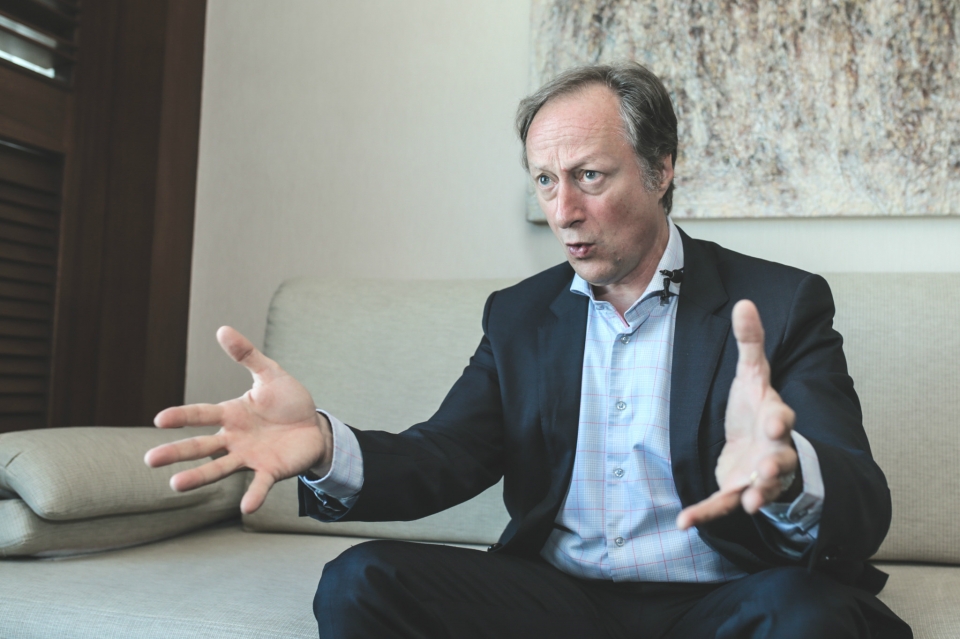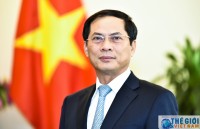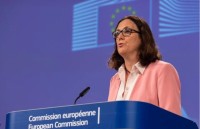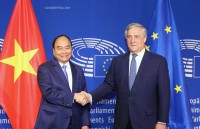
No more major obstacles for EVFTA
Latest
| TIN LIÊN QUAN | |
| CPTPP, EVFTA help Vietnam’s garment-textile lure investment | |
| EVFTA expected to be signed late 2018 | |
Prime Minister Nguyen Xuan Phuc’s official visit to Europe from 14-21 October welcomed the progress on the Vietnam-EU Free Trade Agreement (EVFTA). How do you assess the results of the recent visit?
The recent visit by Prime Minister Nguyen Xuan Phuc to Belgium and also his meeting with President of the European Commission Jean-Claude Juncker took place at the right time. Both sides confirmed their determination to sign and ratify the EVFTA and discussed the next steps to implement the contents of the deal. Two days before the meeting, President Juncker did everything to get the European Commission (EC) to agree with the agreement and pass it on to member countries to give their “green light” and sign the EVFTA. It can be said that during this visit, PM Nguyen Xuan Phuc saw how committed the EU are on realising the EVFTA.
 |
| Ambassador Bruno Angelet, head of the EU Delegation to Vietnam. |
During the visit, President Junker emphasised that the EVFTA is a good example of the EU's current trade policy, bringing unmatched benefits to businesses and people in both Europe and Vietnam. Can you tell us more about the benefits of this FTA?
It’s been 30 years since the two sides set up diplomatic relations. Previously, we concentrated on building a partnership through development aid. But now, Vietnam has become a middle-income country with a fast-growing economy and deep integration with the world economy. The EU wants to help Vietnam improve its governance and promote reforms, becoming a more credible international partner. We want to work with Vietnam to promote the international rule of law and share the vision of a global agenda. We want to strengthen our partnership with Vietnam because the country is a member of ASEAN. We have already signed one FTA with Singapore, and hopefully will sign another with Vietnam in early 2019. This is how we show our commitment to ASEAN – an important partner of the EU. In addition, the EU expects Vietnam and ASEAN to help expand its relationships with other countries in the region, as some are showing signs of abusive power.
With 2019 around the corner, are there any obstacles to the ratification of the EVFTA?
I don’t see any major obstacles preventing the signing of the EVFTA. As of today, all documents related to the agreement have been submitted to the EC, so member countries can take a closer look and approve the signing in the next three months. However, there is another important challenge – the EVFTA needs majority support in the European Parliament, so we have to persuade other Europeans who are reluctant to approve the signing process. Some think the agreement is too ambitious for Vietnam. However, if there is enough will and political determination, I think there will be favourable outcomes from the review and ratification process and the EVFTA will be realised on time.
As someone who has been following the agreement from the beginning, can you tell us about your efforts over the last three years?
After the documents making up the agreement were negotiated and completed in 2015, I have worked extensively with the Vietnamese government as well as the EU headquarters in Belgium to identify areas that need to be prepared for the implementation of the agreement in the future.
| “Vietnam is an active country with huge ambition and is carrying out its diplomatic activities really well. The EU wants to cooperate with countries like Vietnam, with its diversification and multilateralisation strategies which are in line with EU diplomacy. The EU and Vietnam have many similarities in international integration policies. We are also pursuing strategic self-sufficiency, avoiding dependency and building diplomatic means to achieve that goal." “EVFTA is a real test for Vietnam, especially for its ambitions in international integration. This is the first new-generation FTA that the EU will have signed with a middle-income country. Specifically, Chapter 13 on trade and sustainable development is where Vietnam faces the most ambitious commitments. We appreciate and support Vietnam. This FTA is a profitable investment to further improve Vietnam's governance capacity." |
Although there are still doubts over Vietnam’s capacity to implement the FTA, I think we should give Vietnam time and a chance to gradually improve and fulfill its commitments. Making a commitment with 28 countries of the EU is a challenge, but when it is achieved, Vietnam will be able to access one of the largest markets in the world.In 2015, EU leaders asked that the two sides need to prepare carefully by constructing a roadmap. So far, this roadmap is still being actively developed with cooperation by both sides. We also worked extensively with the Vietnamese government to create a positive environment so we could stimulate the ratification of the EVFTA. In addition, after negotiators concluded the legal review of the agreement, I also worked with the European side, during the period from June to September, to prepare for Prime Minister Nguyen Xuan Phuc's visit.
Recently the Belgian Ambassador to Vietnam said that he was impressed with dragon fruit in Vietnam and hoped that it could be exported to Belgium and other EU markets. However, the current drop in prices of the fruit has created a problem. What do you think about this situation and the potential for agricultural cooperation between Vietnam and the EU?
The main reason for the depreciation is an imbalance in supply and demand. In Vietnam, agricultural products are very important and I think it is crucial to diversify export markets, avoiding dependence on a single market.
Vietnam and EU markets have complementary relations. But I think Vietnam needs to promote its products more in Europe, building a good brand as well as maintaining stable quality and also sustainable agricultural production to reach this rather strict market.
In our opinion, the quality of agricultural products in Vietnam is not stable and doesn’t meet international standards recognised by the EU. Many farmers are still pursuing unsatisfactory production methods, using toxic chemicals and ignoring EU food quality requirements. This is a big challenge for the Vietnamese government. We will provide technical assistance to help Vietnam improve the quality of agricultural products exported to the EU./.
 | Deputy FM: PM Phuc’s Europe tour manifests Vietnam’s responsibility Prime Minister Nguyen Xuan Phuc’s official visits to Austria, Belgium, Denmark and the European Union (EU) have arrived at a fine success that created many ... |
 | Vietnam, EU reiterate commitment to trade, investment deals The Vietnamese Government and the European Commission (EC) have pledged to carry out the Europe-Vietnam Free Trade Agreement (EVFTA) and the Investment Protection Agreement (IPA) ... |
 | Vietnam, EU show efforts to soon put EVFTA in place Vietnam and the European Union (EU) demonstrated their efforts to push the early signing, ratification and implementation of their free trade agreement and Investment Protection ... |

















